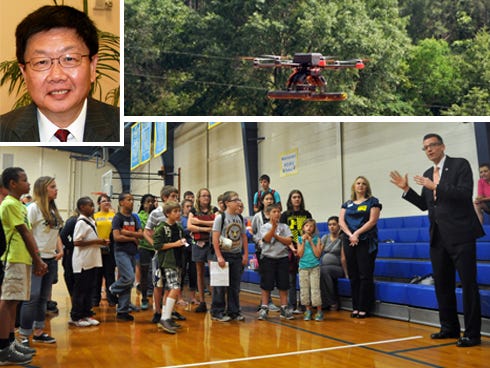
Editor’s Note: This concludes a three-part series on an Okaloosa County engineer’s plans to enhance the Crestview area economy.
LAUREL HILL — The future of Laurel Hill School's STEM instruction is, literally, up in the air.
Boeing recently awarded a $27,000 grant to the Okaloosa County School District, and almost half of it — $13,000 — will help establish LHS's drone and 3D printing curriculum. The remainder goes to Crestview and Choctawhatchee high schools.
North Okaloosa County could use the help, according to area engineer and philanthropist Paul Hsu.
He knew Sean McSheehy, Choctaw's Aviation, Engineering and Robotics teacher, inspired his three children, but he also noticed a heavier emphasis on STEM — science, technology, engineering and math — education in South Okaloosa County.
"Even a small county like Okaloosa, there's a different academic level between the south and north," Hsu said.
If his expansion plans for the Crestview Technology Air Park at Bob Sikes Airport are to succeed, Hsu said he needs a larger pool of tech-savvy workers, and north county schools are the logical place to produce them.
'THEY WERE SO AMAZED'
When McSheehy — the Air Force Association's 2015 Florida Teacher of the Year — approached Hsu for help in securing a grant for his program, Hsu saw his opportunity.
"(McSheehy) said, 'Paul, you understand the importance of tech to the future.' I said, 'Sean, you're preaching to the choir,'" Hsu said. "I said, 'I'll help you with this, but you have to do one thing for me.' He said, 'What?' I said, 'Take your program to the north county.'"
On May 11, McSheehy; his Choctaw student drone and 3D-printing team; Hsu; and area educators visited Laurel Hill School, where McSheehy and his students demonstrated the technology.
Retired Troy University professor Dennis Mitchell, who works with Hsu on local education and technology projects, said the experience showed LHS students the technology's potential.
"Okaloosa County could be the center for drone and 3D printing technology," Mitchell said. "It is very impressive. I'm a tech guy from way back, and what Sean and his kids demonstrated knocked my socks off."
"We had the kids from Choctaw explain what is 3D printing to the kids at Laurel Hill," Hsu said. "I was there and I saw it. Their eyes got so big. It was so interesting to them.
"They saw this robot. They saw this plane. They saw it move in the gymnasium. They saw it fly outside, totally controlled by a human. They were so amazed."
'THIS IS A COMMUNITY SERVICE'
McSheehy and Hsu turned to Embry-Riddle Aeronautics University administrators Chris Harrison and Ron Garriga for help with writing the Boeing grant application.
Hsu sees the university as an integral partner in furthering local STEM education. The school provides CHOICE — Community High Institutes for Career Education — aerospace courses at Crestview and Choctaw high schools.
"Between me and Dennis and Sean, and working with Embry-Riddle, I think we can have a permanent program at Laurel Hill," Hsu said.
"This is a community service for us," Harrison, Embry-Riddle's associate campus director, said. "We have hopes of getting them a program by virtual means. It looks like next year, hopefully, we can bring them a teleconference program.
"Just because they live 'way up in Laurel Hill, which is beautiful, why shouldn't they have the same opportunities a kid in Fort Walton Beach has?" he said.
'ALL KIDS NEED INSPIRATION'
Like Hsu, Harrison believes getting students excited about careers in technology takes a partnership. Toward that goal, Embry-Riddle is adding $20,000 to the Boeing grant.
As the third partner, the school district will assume the cost of teaching the Drone Team their new responsibilities and curriculum, Harrison said.
"All kids need inspiration," he said. "We need math and science, and this is what it's all about. They're going to be excited. Who really cares when bus A and bus B leave the train station and where they'll be when they collide?"
Instead of such traditional, hypothetical math problems, the new program's students will do practical, hands-on technology design projects.
"Maybe they're going to build a propeller, for example," Harrison said. "They're going to learn about how to design and build a propeller, then print it on the 3D printer, and test it and see what works and what doesn't."
'IT'S ABOUT THE KIDS'
While Harrison expects to deliver equipment for Laurel Hill's program — including computers, a 3D printer, more drones and simulators — by 2016, the school's teachers aren't waiting until then.
"The Drone Club," as science teacher Joan Mitchell calls it, met Wednesday afternoon with interested sixth- through 12th-graders. The program — taught by Mitchell and colleagues Wanda Cooper, Neisha Williams and Mildred Strickland — will be an after-school club until a class is offered in the 2016-17 school year.
"If we can start by teaching those sixth-graders, they can do it for years," Mitchell said. "It's good. It's going to be cool."
"This new venture will provide students the chance to learn about drones in everyday scenarios while gaining valuable science, math, technology and writing skills," Williams said. "They will learn real-world applications for the drones."
"This is what it's about: it's about the kids," Harrison said. "It's about getting them the education they deserve. It shouldn't be any different than anybody else just because they live in the country."
"They're great kids, and they're great workers for the future," Hsu said.
This article originally appeared on Crestview News Bulletin: $27K Boeing grant establishes Laurel Hill School technology program (VIDEO)
